- Home
- Lou Cameron
Renegade Page 12
Renegade Read online
Page 12
Captain Gringo noticed Gaston was walking away, not looking back. As the Frenchman disappeared in the crowd the American shrugged and explained to the old man, “The numbers aren’t mysterious, Professor. They’re based on the military statistics they taught us at West Point. A military unit’s enthusiasm for a fight goes up after they’ve taken their first few casualties. By the time an outfit’s lost one third of its members, though, the fight’s knocked out of it. No officer will try to lead his men into another fight right after he’s lost over a third of them. Not if he doesn’t want a bullet in his back. If our ambush killed or wounded at least a hundred of those federal regulars, which would be too good to be true, we can forget them for now. Their surviving officers and N.C.O.s just want to save what’s left for another day.”
“Then what is our problem? I can see you are worried about something.”
“I am. Our battle plan didn’t include letting them know where this pueblo is. That sloppy Carillo came back missing three bodies. If anyone talks, and they will if they’ve been taken alive, and if the leader back at the train has at least two thirds of his men left, and he probably has—”
“Ah, you may be pessimistic. How do we know any of our men were taken alive?”
“More dry statistics. The ratio between killed and wounded in most firelights is one to four. One man killed to four men wounded. We know one man died out there on the desert. If three were hit, it’s simple arithmetic. Even at fifty-fifty one should have been knocked down only wounded.”
He fished for his tobacco makings and added, “One would be too many. We’re going to have to assume the federales know where we are and are in shape to do something about it.”
“My word, you are a pessimist! Is it not just as likely none of our men were captured and the dismounted cavalry is simply stranded out on the desert as we planned?”
“Of course. But battles are won by pessimism. Napoleon might have been right about the Prussians not coming to Wellington’s aid in time at Waterloo, too. Custer had every reason to think he was chasing the usual small war band of thirty-odd Sioux at Little Big Horn. A lot of very good soldiers have learned to be prepared for the worst. The hard way.”
“I see your point. But what can we do?”
“For one thing, end this drunken brawl, right now. Tell Carillo to lead a skirmish line out to meet anyone headed our way. The women, pigs, and chickens here have no business in a firefight. None of us have any need to be pinned down behind these mud walls while the regulars surround us, dig in, and wait for reinforcements to arrive.”
“But we cut the wires!”
“Sure we did. They’ll leave a message with the train crew, telling where they’re headed, and the next train that comes along … Jesus, I haven’t time for a lecture on Tactics One. Let’s get Carillo away from that bottle and the puta on his knee and start taking this war seriously!”
The old man’s spaniel eyes were mournful as he sighed, “The general is not a reasonable man when he’s having a good time. I don’t think he’d shoot me if I tried to give him orders now, but I know he wouldn’t obey them.”
“Right. But you are in charge here, aren’t you?”
“According to the Revolutionary Committee I am. Not according to El Generale. This is one of the problems in recruiting bandits to our cause.”
Captain Gringo glanced up at the moon and said, “It’s getting late and everyone’s getting drunker by the minute. Do the men know you’re supposed to be in charge of this show?”
“They know the Committee appointed me. They take their orders from whoever they’re most afraid of, and El Generale is the most dangerous man in this part of Mexico.”
“Not anymore. If I agree you’re my superior, sir, will you order me to defend this revolutionary unit as your tactical commander?”
“Consider it done. But what about Carillo?”
“That’s the first thing we have to settle, sir. Stay here. This should only take a moment.”
Captain Gringo went to the doorway and elbowed his way into the crowded cantina. He worked his way over to the corner where Carillo was holding court with a plump woman on his knee and a bottle in his free hand. The guerilla leader stared owlishly up at him and said, “Hey, didn’t we fight like tigers, Yanqui? By God, they shall sing ballads of what I did tonight to los federales!’
“The fight may not be over, General. Could I have a word alone with you about our next move?”
Carillo scowled and said, “Hey, what’s this shit? You trying to give orders around here, you crazy gringo? I, Carillo, give the orders in this army.”
“General, we’ve got to plan against a possible counterattack.”
“Bah. We killed all the bastards and I am getting a hard-on for your open mouth! If you don’t want to celebrate my victory, go home and screw your puta like a man!”
It was as good a chance as he was going to get.
Captain Gringo roared, so all could hear, “What was that you said about my mujer, you unwashed motherfucker?”
And then he drew his revolver, shoved the muzzle in Carillo’s astonished drunken face, and blew his brains all over the ’dobe wall behind him.
The woman leaped off the twitching but still seated corpse, screaming. Every other person in the room froze, not breathing, as the tall American yelled, “He who mentions my mujer that way should be more prepared to fight!”
A man from outside stuck his head in to ask, “What happened?” and one of the semi witnesses muttered, “El Generale insulted the Americano’s woman. It’s all over.”
“Jesus, he mentioned women to that big redheaded bastard? Which one died?”
“See for ourself.” Then, as an afterthought, the informative guerilla shouted, “Viva Captain Gringo!”
There was a worried chorus of Vivas, and the woman who’d been sitting on the dead man’s lap calmed down and said, “I never really liked him. He was ugly when he was drunk, and he was drunk most often!”
The tall American jumped up on the table and shouted, “Shut up and listen to me, all of you. The professor has ordered me to defend you and the honor of your women to the death! We expect Los Rurales to counterattack, but you are all heroes and I have fought Apaches on the desert. Is there any man here who won’t follow me?”
A nearby guerilla grinned and said, “Surely you jest, Captain Gringo! I was with you at the train. Not one of the men you led was hit!”
Another shouted, “Cut out the bullshit and give us our orders, Captain Gringo!”
The tall American grinned, holstered his warm revolver, and said, “We start by putting the pulque away and getting to our ponies. I’ll give further instructions as we ride out.”
Chapter Twelve
Trench warfare had been perfected in the American Civil War and taught as a science at West Point. It was impossible to instruct his men in the finer points, even if there’d been time, but as the sky lightened to the east once more, Captain Gringo’s ragtag band was dug in about two miles east of Vegas Salinas. He had a quarter-mile front of foxholes with two guerrillas to each hole and well spread out. He’d sent the ponies back to town, knowing his people were too uncomfortable on foot to consider retreating that way unless they really had to.
Again the professor had insisted on coming along. So, since Gaston had apparently carried out his threat to desert them, he showed the old man in the hole with him how to open the ammo tins and feed the machine-gun belt.
The American had chosen a slight north-to-south rise in the gently rolling desert for their stand, digging his men in on the eastern slope below the skyline to their rear so as not to outline their heads against the horizon. There’d been far more discussion and arguing back and forth than a U.S. Army officer was used to, but the untrained fighters were quick learners and could be counted on to carry out most orders they thought made any sense at all. He’d told them not to smoke, knowing they would, but at least they would keep the glowing cigarettes below ground level as they tri
ed to avoid his eye. If he couldn’t see any lit cigarettes, it was likely nobody else would, either.
As experienced bandits, the men were better than most recruits about sitting tight and sweating out an approaching enemy—assuming, of course, an enemy was coming. He was going to look like an idiot to them if the federales lay doggo on the tracks all day.
The professor at his left seemed to think they were. He kept taking out a pocket watch and muttering, “They’re not coming. You said a man walked at least three of your American miles an hour and—”
“Look, they have to move carefully, expecting something just like this every step of the way. If I were in command of them, they’d be just about on the horizon about now. I’d send some scouts forward ahead of my main force, too. I’m hoping they’ll be a little sloppy and just concentrate on getting within a mile or so of Vegas Salinas before thinking seriously of tactics.”
“I still think our best plan would have been to make a fortress of the pueblo instead of coming all the way out here to meet them in the open.”
“Sure you did. That’s the mistake Travis made at the Alamo. Nine out of ten unprofessional soldiers think they’re safe behind a wall. I’m hoping for at least one officer out there who knows siege tactics and has us down as a mere band of amateurs.”
“You mentioned the Alamo. As a Mexican I am well versed on what occurred there. I thought your Texans put up a very good fight there.”
“They did. Then they all got killed. If you have the edge on an enemy you have no business in a fort. Forts can’t chase him when he simply pulls back out of range. On the other hand, if he has the edge on you, a fort’s a death trap. You’re surrounded and can’t get away to fight another day. Anyone coming is hoping like hell we’ll be waiting for him behind those mud walls back there. He’s already planned how to circle us, dig in, and keep us pinned down until help arrives.”
“But won’t he try to surround us, here, in any case?”
“How do you surround a fluid front on open desert? We’ve got almost as many men and as much ammunition. He’s got no artillery, now, so it’s a stand-up even fight in the open, with us having the advantage of surprise. Oh, oh, I think I see something!”
Both men stared into the dawn and watched a long line of dots moving on the horizon. Someone shouted, “I see them!” and Captain Gringo snapped, “As you were! Next man makes a sound I’ll kill him! Keep your fucking heads down and hold your fucking fire until I open up!”
It seemed to take forever, for the distance was great and the federales were moving cautiously as they advanced in a long skirmish line with the rising sun at their backs. Captain Gringo said, “Good thinking. They’re timing their advance to move in on Vegas Salinas with any guards on the walls staring right into the sun. Yeah, there’s a soldier over there in command.”
The professor gasped, “There must be a million of them!” But Captain Gringo shook his head and said,
“More like two hundred and fifty. You say the numbers and they don’t mean much. But it does look like a real mob, doesn’t it? They’re a bit closer together than I’d have ’em. Not that I’m complaining.”
“When are you going to start shooting? They suddenly seem much nearer than I find comforting!”
“Just as late as I can manage. They’ll drop to the ground in that thick scrub at the first fusillade. I want as many as possible to stay down!”
The long, ragged line of soldiers were in range now, but he held his fire as they advanced. He spotted a portly figure in an officer’s pistol belt and noted the bugler at the officer’s left. The others carried carbines slung on their shoulders, muzzles down, and were packing horse pistols, too. They were cavalry, all right, and some of them were limping. It had been a long, hard march, but to give them their due, they looked like they were still full of pep, considering.
The professor whispered, “For God’s sake, shoot! They’ll be right on top of us in a minute!”
“Quiet. That’s the general idea.”
“When do we open fire?”
“When we have to. They don’t see us. They’re watching the horizon for the rooftops of Vegas Salinas. Probably wondering where the hell it is.”
And then, as the line of soldiers got to within about a hundred yards, a rifle squibbed to their right and the fat officer was falling backward with half his head blown away!
Captain Gringo muttered, “Shit!” and opened up with the Maxim, knocking out the bugler with his first burst, then sweeping left, toward the longest part of the skirmish line.
A dozen men went down like a row of dominos as the other guerrillas opened up and knocked the line snaggle-toothed. And then the ambushed federales came unstuck and started hitting the dirt. As they vanished in the knee-high greasewood scrub he raked the whole front to give them all something to ponder, then stopped and shouted, “Cease fire, damn it!” as his men kept wasting ammunition on blue-green bushes. The firing died away and there was a long moment of dead silence.
Captain Gringo shouted, “Listen, everyone! They’ll crawl in the rest of the way! Forget where you saw them drop and watch the brush right in front of you! This is where it gets interesting!”
He lowered the elevation of the machine gun and let it cool as they fed it another belt. He was keeping an eye on the brush much closer when an arm rose farther out waving a white handkerchief and a distant voice called, “Let us discuss the matter like gentlemen, señores!”
Captain Gringo shouted, “Keep your eyes open, boys. You with the kerchief, on your feet and let’s have a look at you!”
“You promise not to shoot, señor?”
“I don’t promise shit! You want to talk or you want to fight? We’ve got you either way!”
A boyish second lieutenant got to his feet, still waving the hanky, and said, “You seem to have us at the disadvantage, señor. To whom am I addressing my request for terms?”
“I’m a captain in the Army of Liberation, Lieutenant, and you’re damned right you’re at a disadvantage. You’re pinned down with nothing but the water in your canteens and it’s going to be hot as hell in a little while.”
“Some of my people have been hit. Do you have a medic?”
“No. Sorry about that. You want to surrender or shall we hit some more?”
“You must understand my situation, Captain. An officer of the Mexican Army does not surrender.”
“Then what in the hell are you waving that rag at me for? We’re ready whenever you are. Nobody’s going anywhere in a hurry and we’ve got the line to water.”
“I would agree to withdraw with honors of war, Captain. They failed to tell us you had a machine gun.”
“What about your wounded?”
The officer shrugged and said, “These things happen. As you see, we are in no position to take them with us. If you allow us to march back with our weapons, I’ll agree to an orderly withdrawal to the rail line.”
“Will you give me a parole on you and your men?”
“Of course. It is agreed this unit will never fight you again.”
The American murmured, “Professor?” and the old man said, “He’s lying. No Mexican officer has the power to make such an offer under Diaz. Even I can see they’ll wait for help at the railroad and lead them back. Next time, with field guns.”
Captain Gringo nodded and called out, “These are my terms, then. One: You’re to all stand up facing the other way with carbines slung. Two: You’re to form and march away as a unit with no further discussion. Three: Any of your men who wish to remain here as comrades of the Liberation may fall out and join us, hands up, until we get to know them better.”
“None of my men wish to change sides, damn it!”
“I just said there was to be no further discussion. Those are my terms, take ’em or leave ’em. I propose to order skirmishers forward as we keep you pinned down from our trenches, and once I do, there’s to be no quarter. You have one minute to decide.”
“Captain, you must
give me time to consider!”
“You have time to consider. I make it about thirty seconds, now.”
“All right, all right, hold your fire. I agree only to save needless bloodshed. I have your word as an officer, of course?”
“As an officer? Yes.”
He missed it. The shavetail dropped the kerchief to his side and began snapping orders in a self-important tone as wary regulars began to rise from the brush they’d been creeping through.
Captain Gringo shouted, “Heroes of the Liberation, hold your fire! If any of you men out there wish to join us, walk this way with your hands locked behind your neck! The others fall in around your officer!”
As some of the regulars surrendered, grinning, most moved through the brush, eyes down or away, to form up by their lieutenant. To their dubious credit, most of the troopers were loyal to their side. As the first turncoats came into the rebel line the professor asked, “Are they simply to walk away as if nothing happened?”
“Something happened,” said the American, grimly. “That snotty young bastard lied to me about parole. Worse yet, he doesn’t give a shit about his wounded. Things like that should be stepped on before they multiply.”
The old man caught his meaning and gasped, “No! You can’t mean it!”
But Captain Gringo did. As over a hundred men bunched up around the second lieutenant Captain Gringo took a deep breath, swung the muzzle of the machine gun up, and fired!
The bunched-up troopers started going down in a screaming cloud of bloody hash as he emptied the belt into their closed ranks. As the last man dropped again into the brush he ceased fire and yelled, “Up and at ’em, muchachos! Mop the bastards up!”
A wave of guerrillas boiled out of the foxholes, screaming with joy of battle as they ran forward. Not all of the betrayed troopers were dead, of course, so two guerrillas were hit before they’d swarmed all over the few survivors and killed the last one.
It took less than three minutes, including the wounded scattered here and there in the brush. As they waited for the-pack horse to come from town to carry the machine gun, the professor was crying. He said, “Oh my God, I never authorized cold-blooded murder!”

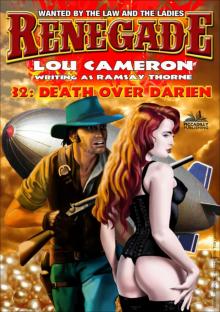 Renegade 32
Renegade 32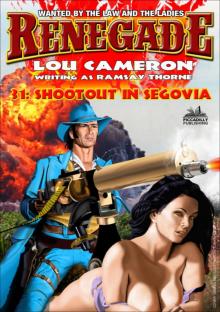 Renegade 31
Renegade 31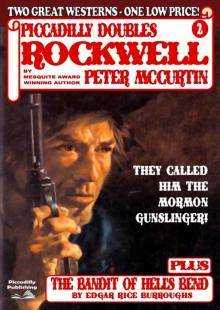 Piccadilly Doubles 2
Piccadilly Doubles 2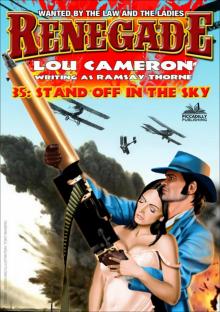 Renegade 35
Renegade 35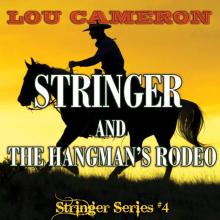 Stringer and the Hangman's Rodeo
Stringer and the Hangman's Rodeo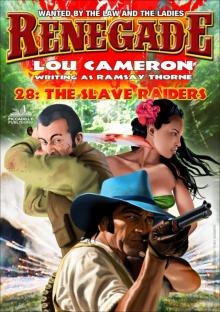 Renegade 28
Renegade 28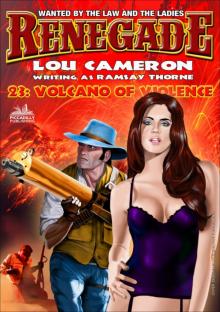 Renegade 23
Renegade 23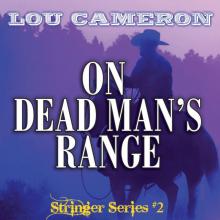 On Dead Man's Range
On Dead Man's Range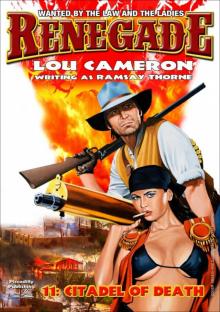 Citadel of Death (A Captain Gringo Western Book 11)
Citadel of Death (A Captain Gringo Western Book 11)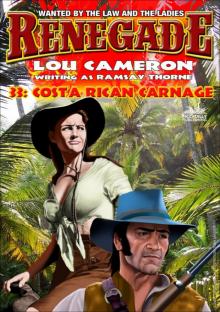 Renegade 33
Renegade 33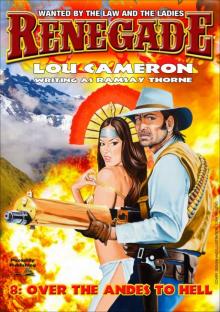 Over the Andes to Hell (A Captain Gringo Western Book 8)
Over the Andes to Hell (A Captain Gringo Western Book 8)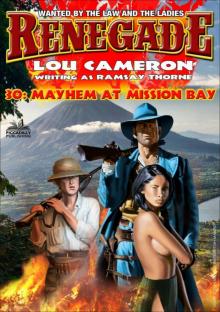 Renegade 30
Renegade 30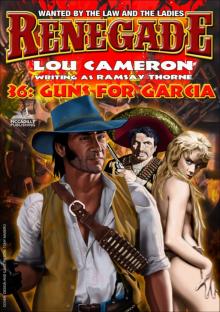 Renegade 36
Renegade 36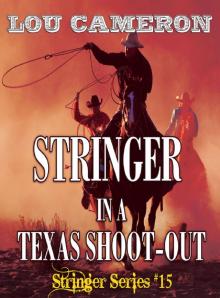 Stringer in a Texas Shoot-Out
Stringer in a Texas Shoot-Out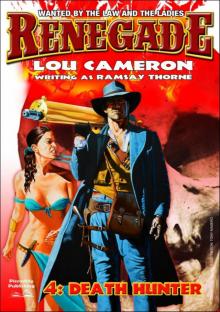 The Death Hunter
The Death Hunter Stringer and the Wild Bunch
Stringer and the Wild Bunch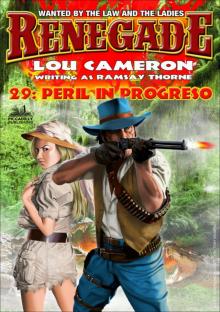 Renegade 29
Renegade 29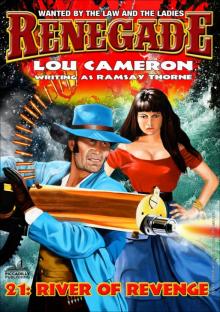 Renegade 21
Renegade 21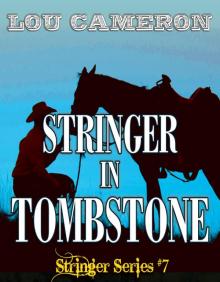 Stringer in Tombstone
Stringer in Tombstone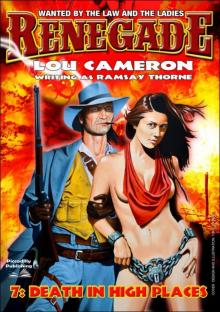 Death in High Places (A Renegade Western Book 7)
Death in High Places (A Renegade Western Book 7)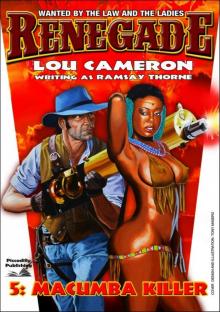 Macumba Killer
Macumba Killer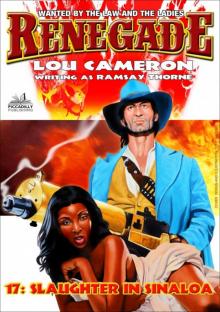 Renegade 17
Renegade 17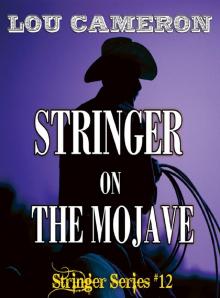 Stringer on the Mojave
Stringer on the Mojave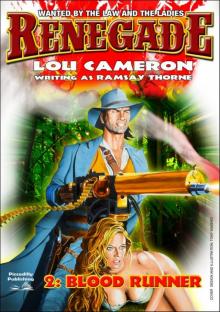 Blood Runner
Blood Runner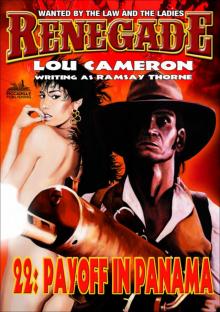 Renegade 22
Renegade 22 Stringer and the Hanging Judge
Stringer and the Hanging Judge Stringer and the Hell-Bound Herd
Stringer and the Hell-Bound Herd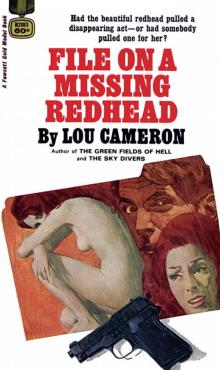 File on a Missing Redhead
File on a Missing Redhead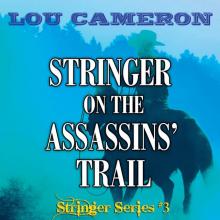 Stringer on the Assassins' Trail
Stringer on the Assassins' Trail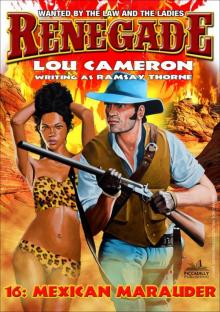 Mexican Marauder (A Captain Gringo Adventure #16)
Mexican Marauder (A Captain Gringo Adventure #16)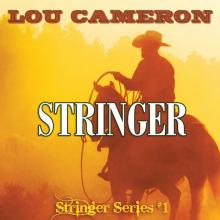 Stringer
Stringer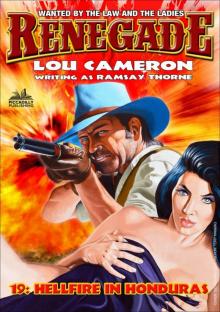 Renegade 19
Renegade 19 Stringer and the Oil Well Indians
Stringer and the Oil Well Indians Stringer and the Lost Tribe
Stringer and the Lost Tribe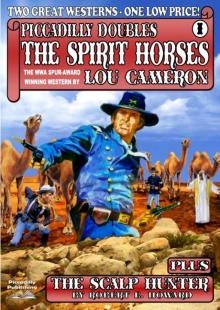 Piccadilly Doubles 1
Piccadilly Doubles 1 Stringer and the Border War
Stringer and the Border War Renegade
Renegade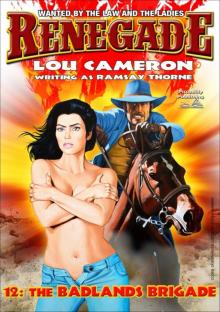 The Badlands Brigade (A Captain Gringo Adventure Book 12)
The Badlands Brigade (A Captain Gringo Adventure Book 12) Stringer and the Deadly Flood
Stringer and the Deadly Flood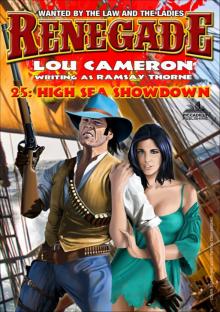 Renegade 25
Renegade 25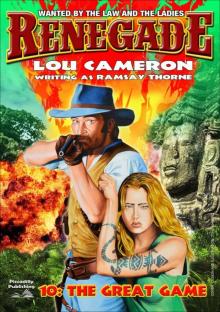 The Great Game (A Captain Gringo Western Book 10)
The Great Game (A Captain Gringo Western Book 10)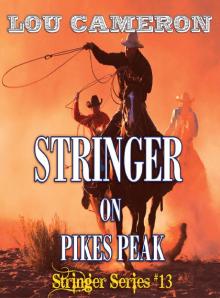 Stringer on Pikes Peak
Stringer on Pikes Peak